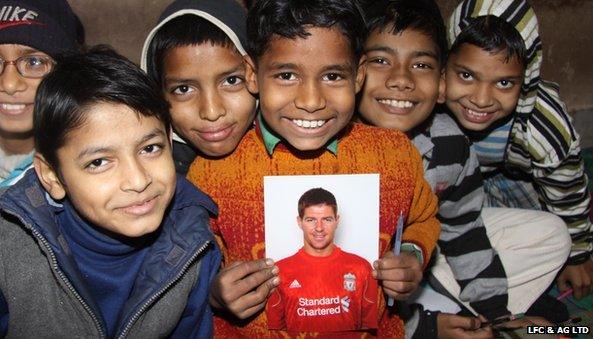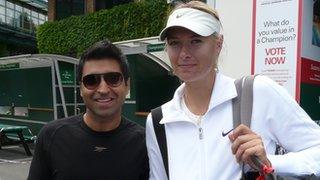Building sporting dreams in India
- Published

The English Premier League is a big draw among Indian sport fans
It surprises many people that despite its cricketing success, a country of 1.2 billion can fail to win a single gold medal at the London Olympics, or that its national football team is ranked only 169th in the world.
But India's huge, youthful population, its growing economy and increasing access to media are attracting major global sports organisations keen to invest in the passion and potential on offer.
The popularity of football in India took Steve Bellis by surprise. He works with Liverpool FC in its overseas development programmes, and travels to the country up to 10 times a year.
"When I first went to India, I thought it was going to be all cricket," he says. "But I saw kids playing football everywhere - on fields, in the street, on the beach in Mumbai.
"The sport is emerging here and it's a huge market."
For Indian football fans the biggest draw is England's Premier League, widely available on TV.
Liverpool is just one of the clubs trying to establish a presence in India. Rival Manchester United has opened a small chain of stores in major Indian cities and has even appointed an Indian to its board of directors.
Mr Bellis believes in a patient, long-term approach in India. He does not think there is easy money to be made, nor does he want to try.
"Many clubs open what they call academies", he says.
"In reality they're soccer schools that coach kids whose parents can afford to pay. It's not based on ability.
"We want to use the profits from our schools to fund a proper football academy for the best young players, and also a college for sports professionals."
There are sound economic reasons for putting in development money. If more children play, the greater the overall interest in the sport.
Teaching young Indians about marketing, sports medicine and other important aspects of the industry could also eventually reap rewards for overseas investors.
Despite experiencing the frustrations of doing business in India, such as transport and bureaucracy, Mr Bellis sees opportunities.
"It's a huge advantage if you can find the right partners, like we have," he says. "India is full of talented, smart people and there is a real 'can do' attitude."
'Players become fans'
Akash Jain, a 37-year-old from Detroit, manages the National Basketball Association's business affairs in India.
He is one of many Indian-American "returning" to a country their parents left many years ago.
"It's rewarding to play a key role in the development of a sport I love, in a country I have a strong personal connection with," he says.

America's National Basketball Association is trying to build a following in India
Mr Jain says he enjoys Mumbai, and plans to stay for the next few years.
The NBA is the only global sports league to have committed to a permanent base in India. "You have to be here to do business here," he says.
They recently signed a major broadcasting deal, giving the sport more exposure. Fans in India will be able to watch around 100 live games a season, as well as programmes about basketball.
But for Mr Jain, it's not just about TV viewers.
"The game of basketball is at the core of the NBA's global vision," he tells me. "We encourage participation, and believe players are likely to become fans.
"There are five million people playing basketball regularly in India and we have seen a 50% rise in participation in NBA grassroots programmes over the last two years, involving 1,000 teams across the country."
Although basketball is a simple game, like football its tactical intricacies are best understood by those who play.
The numbers Mr Jain mentions may create the kind of knowledgeable, passionate fans every sport needs in order to make money.
Besides, as he points out: "Basketball is perfectly suited to India. Beyond a ball, a hoop and a couple of players, you don't need much equipment and you can play in dense urban spaces."
No easy business
While big football clubs and major global leagues like the NBA are sending people to India, Indians who have worked and studied abroad are also coming back to get involved in the growing sports industry.
Vivek Sethia, 32, is a Delhi-born graduate of Cornell University who spent three years working for a leading consultancy in New York.

Vivek Sethia with tennis champion Maria Sharapova
He had always been a sports fan, and was a junior roller-skating champion in India. Competing in a minority sport with little funding inspired him to get involved in sports development.
"When it comes to developing and promoting sport in India, I'm a purist. If I had millions to invest, I'd put the money in myself."
Instead he uses the business skills acquired from an Ivy League education to advise other investors. They get a return, the sport gets funding.
Sport is not an easy business in which to make money. Almost all big football clubs struggle to make profits.
India in turn presents many complex challenges. The long-term, developmental strategy advocated by the likes of Liverpool and the NBA might be the only way.
"The sports industry in India doesn't offer returns as big as, say, the property market," says Mr Sethia.
"Anyone investing here has to have a genuine interest in sport - they wouldn't do it if it were just about money."
We want to hear from you. You can contact BBC journalists @HasitShah, external and @Rajiniv, external on Twitter, where you can also join the conversation and share your thoughts using the hashtag #bbcindiandream, external.